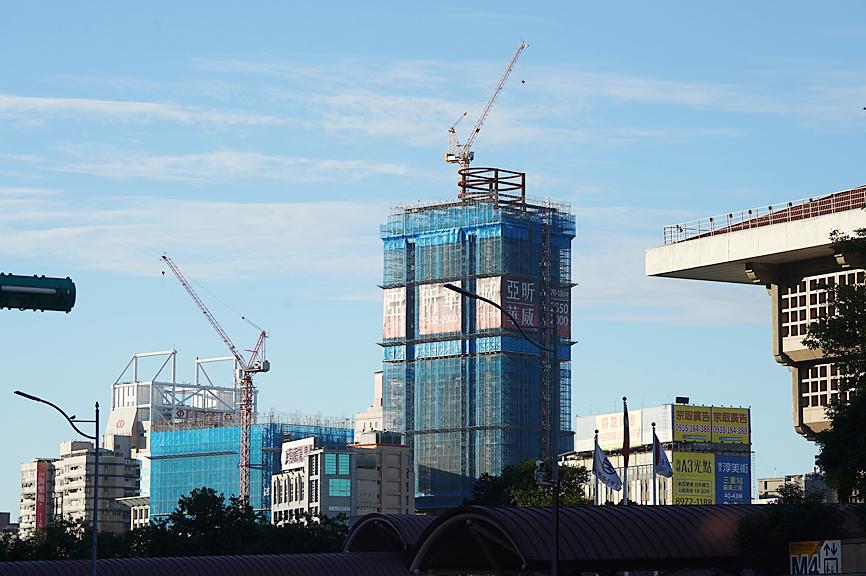Presale and new housing projects in Taiwan’s major municipalities for the upcoming spring sales season total NT$700.7 billion (US$24.64 billion), an increase of 5 percent from a year earlier, as developers are upbeat about sales, Addcn Technology Co’s (數字科技) online realty arm said yesterday.
The volume represents a five-year high and includes projects in Taipei, New Taipei City, Taoyuan, Taichung, Tainan and Kaohsiung, as well as Hsinchu city and county, newhouse.591.com (591新建案) said.
“The supply side seems unfazed by uncertainty linked to Russia’s invasion of Ukraine and additional credit controls imposed by the central bank,” the online broker said, as inflation concerns tend to lend support to real-estate transactions in Taiwan.

Photo: CNA
Assorted surveys have found that real estate is the tool preferred among Taiwanese for combatting inflation, the broker said, adding that local interest rates would remain low even if the central bank opts to raise borrowing costs.
The projects for sale in Taipei total NT$127.7 billion, with The Diamond Tower, a high-profile urban renewal project, accounting for NT$45 billion, it said.
The mixed-use complex offers 98 luxury apartments that start at NT$2.5 million per ping (3.3m2) given its location near Zhongxiao-Fuxing MRT Station, it said.
New Taipei City is to see the launch of projects in Tamsui (淡水), Sanchong (三重) and Sinjhuang (新莊) districts that together could generate NT$197.95 billion in sales, or a 25.75 percent pickup from a year earlier, it said.
Presale and new projects are expected to increase 7.03 percent year-on-year to NT$96.47 billion in Taoyuan, while more than doubling to NT$70.58 billion in Hsinchu city and county, the broker said.
Developers in Hsinchu last year turned low key after controversial marketing practices angered regulators.
Presale and new projects are expected to fall 5.55 percent to NT$18.03 billion in Taichung, while declining 67.32 percent to NT$14.11 billion in Tainan, due to high comparison bases last year and lingering labor shortages, it said.
However, those factors have failed to deter swift growth in Kaohsiung, where NT$75.86 billion of presale and new projects are to join the market, suggesting growth of 45.86 percent from a year earlier, it said.

UNCERTAINTY: Innolux activated a stringent supply chain management mechanism, as it did during the COVID-19 pandemic, to ensure optimal inventory levels for customers Flat-panel display makers AUO Corp (友達) and Innolux Corp (群創) yesterday said that about 12 to 20 percent of their display business is at risk of potential US tariffs and that they would relocate production or shipment destinations to mitigate the levies’ effects. US tariffs would have a direct impact of US$200 million on AUO’s revenue, company chairman Paul Peng (彭雙浪) told reporters on the sidelines of the Touch Taiwan trade show in Taipei yesterday. That would make up about 12 percent of the company’s overall revenue. To cope with the tariff uncertainty, AUO plans to allocate its production to manufacturing facilities in

TAKING STOCK: A Taiwanese cookware firm in Vietnam urged customers to assess inventory or place orders early so shipments can reach the US while tariffs are paused Taiwanese businesses in Vietnam are exploring alternatives after the White House imposed a 46 percent import duty on Vietnamese goods, following US President Donald Trump’s announcement of “reciprocal” tariffs on the US’ trading partners. Lo Shih-liang (羅世良), chairman of Brico Industry Co (裕茂工業), a Taiwanese company that manufactures cast iron cookware and stove components in Vietnam, said that more than 40 percent of his business was tied to the US market, describing the constant US policy shifts as an emotional roller coaster. “I work during the day and stay up all night watching the news. I’ve been following US news until 3am

COLLABORATION: Given Taiwan’s key position in global supply chains, the US firm is discussing strategies with local partners and clients to deal with global uncertainties Advanced Micro Devices Inc (AMD) yesterday said it is meeting with local ecosystem partners, including Taiwan Semiconductor Manufacturing Co (TSMC, 台積電), to discuss strategies, including long-term manufacturing, to navigate uncertainties such as US tariffs, as Taiwan occupies an important position in global supply chains. AMD chief executive officer Lisa Su (蘇姿丰) told reporters that Taiwan is an important part of the chip designer’s ecosystem and she is discussing with partners and customers in Taiwan to forge strong collaborations on different areas during this critical period. AMD has just become the first artificial-intelligence (AI) server chip customer of TSMC to utilize its advanced

Six years ago, LVMH’s billionaire CEO Bernard Arnault and US President Donald Trump cut the blue ribbon on a factory in rural Texas that would make designer handbags for Louis Vuitton, one of the world’s best-known luxury brands. However, since the high-profile opening, the factory has faced a host of problems limiting production, 11 former Louis Vuitton employees said. The site has consistently ranked among the worst-performing for Louis Vuitton globally, “significantly” underperforming other facilities, said three former Louis Vuitton workers and a senior industry source, who cited internal rankings shared with staff. The plant’s problems — which have not